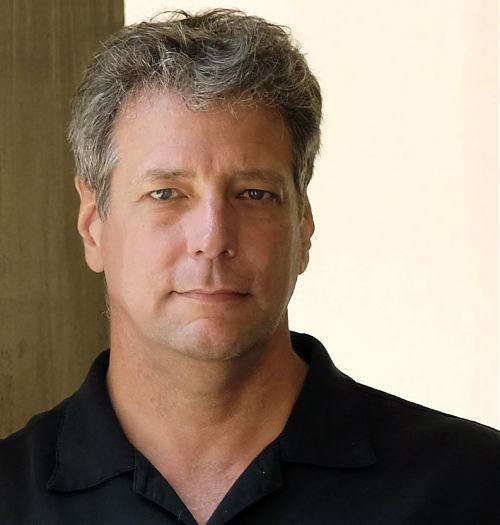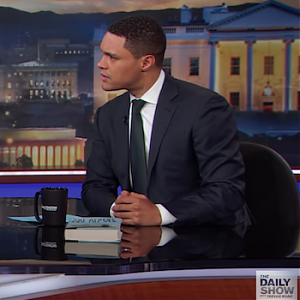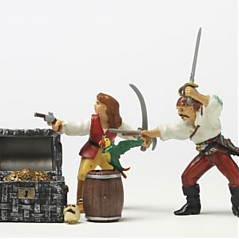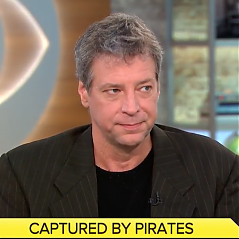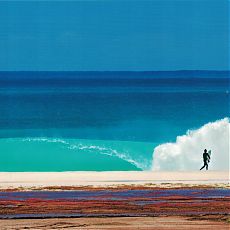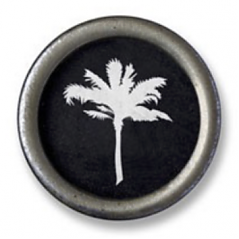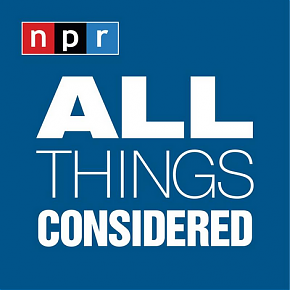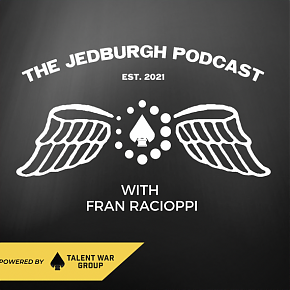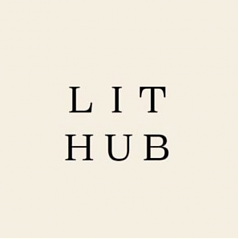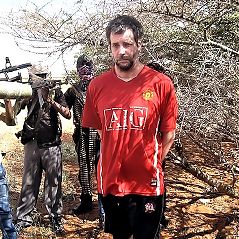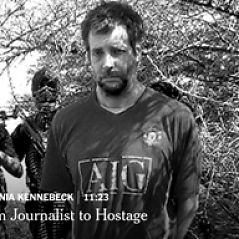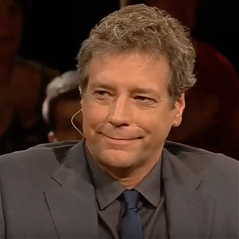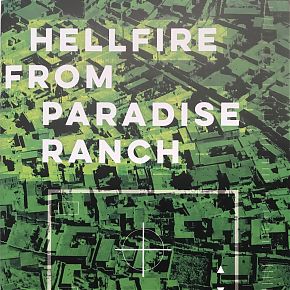In Another Country
Rural Indonesian Muslims talk about voting for president.
San Francisco Chronicle Magazine
September 2004
Amat took me to Sengkol, his village, which was just a cluster of buildings roofed in corrugated tin. It straddled Lombok’s main highway like a village on the Nile: Food stalls, odds-and-ends stores, and shacks for bottles of gasoline hung out signs to draw business from the daily stream of traffic. Trees overhung the road in Sengkol, and kids on top of rice trucks would crouch to avoid getting knocked by a branch.

Amat had just finished showing me Lombok island on a motorbike. We drank coffee on the dirt porch of his family’s shop and studied a fresh spate of rain. He treated me like a tourist, and I let him. I wanted to write about Indonesia’s presidential election from the citizens’ point of view, and if possible I preferred to vanish, to avoid announcing myself as an observer.
“Good coffee,” I said.
“Yes? You want some?”
“I have some.”
“No, you must take some home. A kilo of Lombok coffee! To remember your trip!”
“No, seriously —”
Amat told his wife, Johar, that I wanted a kilo of Lombok coffee, and they rode off on a motorbike to buy some dried unroasted beans from a dealer down the road. For the rest of the afternoon — after doing laundry at the village well — Johar worked at winnowing husks from beans in a bamboo pan, roasting the coffee in a nearby oven, and grinding the beans by hand. “Seriously. I don’t need the coffee,” I told them, but Johar smiled; she was happy to do it. Her hands worked while Amat relaxed (having earned his money from me) — first outside the shop, later in front of their woven-bamboo house across the road. Johar sat with us and made pungent, quick-tongued comments at anything her husband said.
Lombok is the small island next to Bali, poor and Muslim and dependent on tourist overflow. For this reason Amat would vote for Susilo Bambang Yudhoyono, a retired general. A military man might keep the nation stable, he thought, and Indonesia needed peace. The Bali bombings had ruined Lombok’s economy.
I asked, “What about Megawati?”
The incumbent president, Megawati Sukarnoputri, was not popular. Amat said that most of Lombok wouldn’t vote for her.
“Woman president, no good,” he said. “Must be a man.”
“For Islamic reasons?”
“Yes.”
“What does Johar think?”
Johar shook her head. She had no opinion. Politics were not her thing. Strange question from a tourist, anyway.
“You want to see a traditional Sasak village?” Amat asked.
“No thanks.”
“You want to do anything?”
“No. Actually, you know what? I’m a journalist. I’d like to interview Johar.”
I pulled out a recorder that had been in my bag for most of the day.
“Interview about what?”
“The elections.”
This excited Amat. A journalist! He quit being a tour guide and went out to find neighbors who would share their opinions. A mother with a child in a sling, a young athlete with a pink volleyball, and a devout-looking Muslim in loose clothing and a white pillbox cap all came in to sit down. Johar went first. She said Susilo was probably her man for president. She wanted to throw something at the TV every time a candidate named Amien Rais came on; he was too pompous. Megawati was unacceptable.
“For the same reason?” I asked Amat, who translated.
“Yes,” Amat said. “Woman no good as president. Not strong. She needs to stay in the kitchen!”
“Johar said that?”
“Yes.”
Everyone who came through Amat’s house had roughly the same opinion. Sengkol was a conservative place. Only the devout-looking Muslim, who’d been on a hajj to Mecca, disagreed about Susilo. I could tell he loathed the United States. He had dark almond eyes and that frightening quiet manner of a jihadist — a limp, resigned, watchful silence. He wore a thin curtain-fringe beard and hid his laughing mouth behind the collar of his shirt, as if embarrassed to show his teeth. Amat called him “Haji.”
“Who would you vote for?”
“I don’t like any of the candidates.”
I understood his answer well enough to change the subject. Radical Muslims had no one to vote for in this election.
Did he feel the Iraq invasion was a war on Islam? I asked.
“All Muslims are brothers,” he said carefully. “When anyone attacks a part of Islam, all Muslims feel a pain in their hearts.”
Amat added, “That’s how I feel, too.” He pointed to his chest. “It hurts to hear about Muslims dying.”
Haji stared with his eerie quietude. He had politely made clear that we were enemies. Now that I was a journalist a shadow of politics, or plain misunderstanding, had fallen between me and everyone on the porch. Washington had enough trouble explaining its rationale to Americans; how could the war begin to make sense to Muslim villagers in Sengkol?
I asked another neighbor, who had mixed opinions on the war, if he saw it as a response to September 11, and his answer was the surprise of that rainy afternoon. When Amat described our most recent defining disaster, this tall, secular-minded man, reticent behind squarish glasses and the brim of a driving cap — by no means unintelligent — had no idea what I meant.
“He’s never heard of September 11?”
“He doesn’t watch much television,” said Amat.
Michael Scott Moore
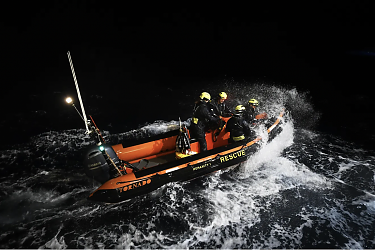
Rafts of the Medusa
Why every day on the Mediterranean is a new scandal for Europe. For both Foreign Policy and Die Zeit.
California’s Attempt at Land Reparations
How land seized from a Black family 100 years ago may be returned. The Bruce’s Beach story from a hometown angle, for The New Yorker
Day of the Oprichnik, 16 Years Later
The novelist Sorokin, the president Putin, his man Dugin, and the war in Ukraine. For n + 1.
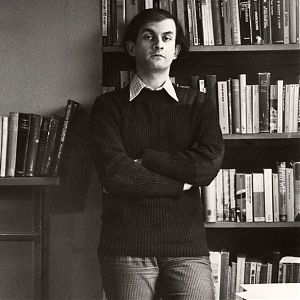
The Rushdie Narrative
Knife and the crumbling ground beneath free speech
There Must Be Some Way Out of Here
An essay on Bob Dylan, “All Along the Watchtower,” and Somali pirate captivity.
That Mystic Shit
The life of Lou Reed in two biographies
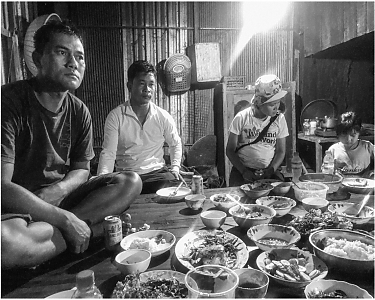
Cambodian Seafarers Talk About Pirates
Mike visits Cambodia for The New Yorker to talk about a harrowing shared experience in Somalia
The Muslim Burial
Cambodian hostages remember digging a grave for one of their own. A sequel chapter to The Desert and the Sea
The Real Pirates of the Caribbean
Adventure journalism in Southern California. A travel essay for The Paris Review.

Antifa Dust
An essay on anti-fascism in Europe and the U.S., for the Los Angeles Review of Books
Was Hitler a Man of the Left?
A book that helped Republicans in America lose their damn minds.
Ghosts of Dresden
The Allied firebombing of Dresden in 1945 destroyed the baroque center of what Pfc. Kurt Vonnegut called, in a letter home from Germany, “possibly the world’s most beautiful city.”
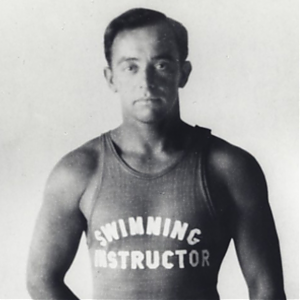
George Freeth, Biographed
The first academic treatment of America’s surf pioneer. Also, was Freeth gay?
It’s Called Soccer
Americans live on what amounts to an enormous island, defended on two shores by the sea, and we’ve evolved a few marsupial traditions that nobody else understands.
Tilting at Turbines (in the Severn River)
The morning was clear and cold, with frost on the church steeple and the cemetery grass. I had a quick English breakfast at a white-cloth table, in my wetsuit, and drove to Newnham, a village on the Severn River in Gloucestershire, parking near the White Hart Inn.
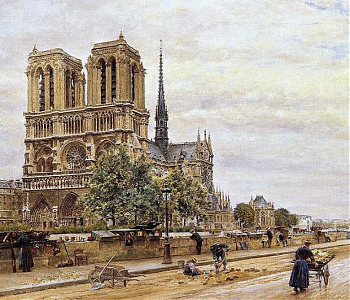
The Curse of El Rojo
I’d packed the car lightly — a bag of clothes, a bag of cassette tapes, a backpack of books, a few essential tools.









